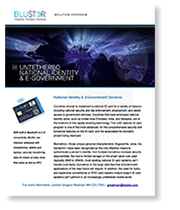
National ID
Most existing national ID card systems can't handle multi-factor biometrics or the large data files that eGovernment applications of the near future will require.
National ID
Countries choose to implement a national ID card for a variety of reasons, including national security and law enforcement, employment, and easier access to government services. Countries that have embraced national identity cards, such as United Arab Emirates, India, and Malaysia, are at the forefront of this rapidly evolving technology. The UAE national ID card program is one of the most advanced, for the comprehensive security and functional features on the ID card, and the associated iris biometric project being deployed.

What's Possible? Read our White Paper
Enhanced Security using Multi-Factor Biometric Authentication
Biometrics—those unique personal characteristics: fingerprints, voice, iris, handprint—have been recognized as the only effective means to authenticate a person's identity. And multiple biometrics increase security exponentially. But due to limited storage on the smart cards now used (typically 28kB to 256kB), most existing national ID card systems can't handle multi-factor biometrics or the large data files that eGovernment applications of the near future will require. In addition, the need for bulky and expensive conventional or RFID card readers means today's ID card systems can't perform in an increasingly untethered mobile world.
More than 96 countries have implemented electronic ID, contributing to global growth in ID smart card business revenues to $3.5 billion this year. The drive in new, higher performance product adoption will result in end user national ID smart card revenues increasing from $3.5 billion in 2012 to $7.6 billion in 2017, according to ABI Research.
Multi-application solutions are proven and the business case is clear, which is why adoption and migration to higher end technology continues to grow even in the face of economic uncertainty.
John Devlin, ABI government practice director
A ‘Smarter’ National ID Program
With its unique combination of multi-factor biometrics, large storage capacity, and Bluetooth wireless connectivity, the BluStor smart card is the first solution that satisfies these demanding requirements. Based on breakthrough technology, the BluStor smart card platform enables effective, timely delivery of information in an untethered world, through multi-factor biometric identity authentication and secure high-capacity personal records storage—in a system that does not require an internet connection or a dedicated card reader. BluStor meets all the requirements for a mobile, secure card platform for multiple high-end applications such as:
- National ID card/Driver's license
- Border crossing/Guest worker
- Student ID card: attendance, library, lab, stored value
- Access control: facilities, computers, documents
- Housing: coupons, food stamps
- E-commerce: mobile payments, loyalty programs
- Medical: EMT, hospital, pharmacy, personal medical records
Existing applications can be migrated to the BluStor platform with minimal cost and impact, and upgraded as needed without replacing the card. Given its unparalleled security and storage capability, and that any Bluetooth-enabled mobile device can be a card reader, BluStor is the ideal platform for national ID cards and other eGovernment applications in a world where users increasingly access information via mobile devices.
